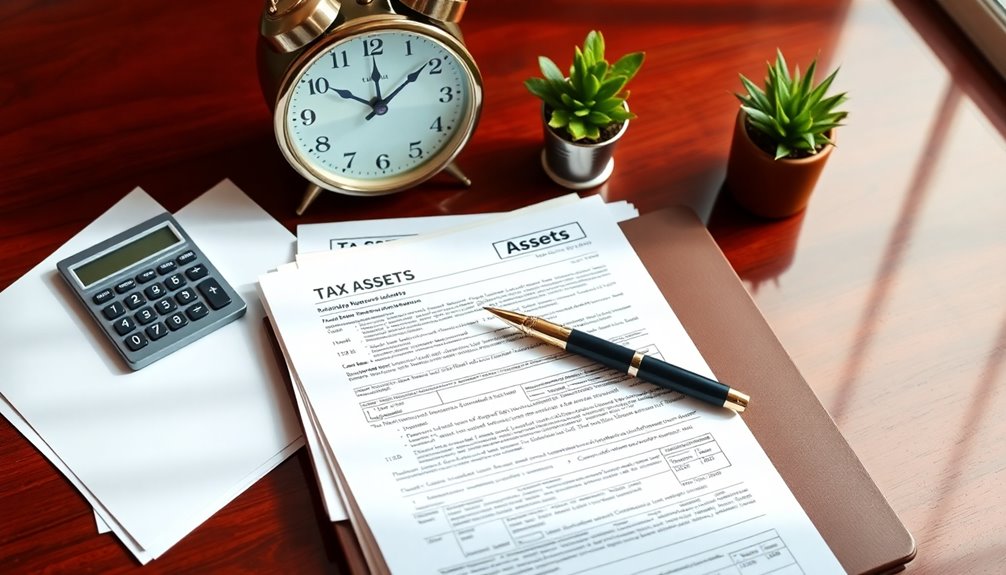You should keep your tax returns and supporting documents for at least three years after filing or the due date. This applies to both paper and electronic records. If you underreport your income by 25% or more, extend the retention to six years. For employment tax records, maintain them for at least four years. Certain state regulations may also dictate longer retention periods. Keeping your documents organized not only helps comply with IRS rules but can also prepare you for potential audits. There's more to consider on this important topic, so keep exploring your options and requirements.
Key Takeaways
- Keep tax returns and supporting documents for at least three years after filing or the due date for IRS compliance.
- Retain records for six years if income is grossly understated by 25% or more to prepare for potential audits.
- Store sales and use tax records for a minimum of four years to meet state requirements.
- Maintain employment tax records for at least four years after the due date to comply with tax regulations.
- Keep asset-related documents, such as purchase prices and improvements, for the asset's lifespan or until the statute of limitations expires.
General Retention Guidelines

When it comes to keeping your tax records, it's crucial to understand the general retention guidelines. You should retain most tax returns and supporting documents for at least three years after you file your return or the due date, whichever is later. This timeframe accounts for potential IRS audits and allows you to file amended returns if necessary.
This rule applies to both paper and electronic records, ensuring you meet IRS statute of limitations requirements. Make sure to keep essential documents like your tax returns, W-2s, 1099s, and supporting forms and schedules.
It's also important to hold onto records of income and deductions, as well as employment tax records. For financial and expense records, you'll want to keep bank statements, investment annual statements, and canceled checks for the same three-year period. Additionally, you should be aware that employment tax records must be kept for four or more years after the tax due date.
If you run a business, keep detailed records of business expenses, including receipts and invoices, along with travel and asset purchase documents. Staying organized and adhering to these retention guidelines will help you navigate your tax responsibilities effectively and avoid issues with the IRS.
Extended Retention Scenarios

Understanding the need for extended retention of tax records can save you from headaches down the road. If your income was grossly understated—specifically by 25% or more—you should keep your tax returns and supporting documentation for at least six years. This extended period is crucial, as it protects you against potential IRS audits. Additionally, maintaining these records aligns with the long-term benefits of tax reform, ensuring that you're prepared for any adjustments in tax policy that might affect your filings.
When it comes to property and investment records, retain those documents for at least seven years after disposing of the asset or closing your business. Keeping these records helps you accurately report gains or losses and prepares you for any future audits.
For employment tax records, maintain all relevant documentation for at least four years after the tax return's due date or payment date. This includes payroll data and tax payments, as failing to comply can lead to significant penalties.
Lastly, keep records for specific tax credits and deductions—like medical or educational expenses—potentially for seven years or more. Detailed documentation supports your claims in case of an audit, ensuring the legitimacy of your deductions.
State Tax Record Retention

State tax record retention is crucial for ensuring compliance with varying regulations across different jurisdictions. Each state has specific rules regarding how long you should keep your tax records.
For instance, in Indiana and New York, you need to retain records for at least three years. However, New York requires you to keep them longer if they could affect tax administration.
Kentucky has a four-year statute of limitations, but you must hold onto tax payment records for seven years and other income records for five years.
In Ohio, the retention period aligns with the four-year statute, while Tennessee mandates keeping records for three years from December 31 of the filing year.
Wisconsin also follows a four-year retention guideline. It is important to remember that audit rights may extend the retention periods for certain records, particularly if there are discrepancies.
Be aware that states generally have audit rights that could affect these timelines. Maintaining easily accessible records, especially in electronic formats, is essential for compliance.
Additionally, if you claim foreign tax credits, you might need to store those records for up to ten years. Always check state-specific requirements to ensure you meet all necessary obligations.
Specific Document Categories

Keeping track of specific document categories is essential for effective tax management and compliance.
Start with income-related documents like your W-2 and 1099 forms; keep these for at least three years from the filing date. Don't forget to hold onto bank statements that show income-related transactions, and save your paycheck stubs for one year or until you verify pay details.
For expense and deduction documents, retain invoices and receipts for deductible expenses for at least three years. This includes canceled checks and receipts for charitable donations and medical expenses. If you've made home improvements, keep those receipts as well. Additionally, remember that IRS suggests keeping tax documents for at least three years post-filing.
When it comes to investments, hold onto brokerage statements until you sell the assets. For property transactions, keep the purchase and sale documents until the statute of limitations expires. You should also maintain retirement account documents indefinitely.
Lastly, for business and employment documents, keep payroll records and business-related bank statements for at least three years. This ensures you've got everything covered when tax time rolls around, helping you stay organized and compliant.
Audits and Legal Implications

The importance of maintaining accurate records extends beyond just compliance; it plays a key role in protecting you during audits and legal situations.
The IRS generally has three years to audit your tax returns, but this period can extend to six years if you underreported your income by over 25%. If you failed to file a return or submitted a fraudulent one, there's no statute of limitations at all.
Being unprepared for an audit can lead to additional taxes, interest, and civil penalties, including a common 20% accuracy-related penalty. Additionally, failing an audit can result in a larger tax bill due to underreported taxes.
If the IRS discovers intentional violations, you could face criminal charges, which are rare but serious. Remember, less than 2% of audits lead to criminal charges, but the consequences can include hefty fines and prison time.
To defend yourself effectively, keep your tax returns and supporting documents for at least three years.
If you have potential issues, such as underreported income or claims for bad debts, consider holding onto records longer.
Engaging a tax attorney can also help you navigate the audit process, ensuring you're ready to dispute any findings and avoid penalties.
Disposal of Old Records

When it comes to disposing of old tax records, understanding the guidelines can save you from potential headaches.
First, know the federal retention periods: keep your tax returns and supporting documents for at least three years after filing. If you underreported income by 25% or more, hang onto those records for six years. For bad debt deductions or worthless securities, retain documents for seven years. In cases of fraud or if you didn't file a return, keep everything indefinitely.
State guidelines may differ, so check with your state's tax agency. Some states, like California and Arizona, follow a four-year rule, while Montana has a five-year limit. IRS mandates that federal tax returns should be kept for at least three years; if income is underreported by 25%, this extends to six years.
For businesses, maintain sales and use tax records for at least four years. Employment tax records should be kept for four or more years post-due date. Keep records related to property and business expenses for at least seven years after disposal.
Finally, dispose of your documents securely. Shred paper records, and ensure electronic records are complete and accessible for IRS inspection.
If you're managing county tax records, remember that destruction needs board approval and a certified permanent record must be made.
Organizing Tax Documents

How can you effectively organize your tax documents to streamline filing and retrieval? Start by keeping copies of your tax returns and all supporting documents for at least three years after filing. This covers the standard audit statute for the IRS. For specific situations, like underreporting income or claiming refunds, you'll need to adjust your retention period accordingly.
Use an accordion folder to sort tax items by year, making it easier to access when needed. Include income-related documents, like W-2s and 1099s, as well as expense-related paperwork, such as invoices and receipts.
Don't forget to keep records related to your home, investments, and any rental properties or small businesses you manage. Retaining records for three to seven years can help ensure you're prepared for any potential audits.
Periodically reduce unnecessary paperwork, especially after three years, to free up storage space. Make sure all backup documents relate to your tax situation to avoid clutter.
Lastly, store utility bills and relevant documentation that may support deductions, so you're prepared in case of an audit. By following these steps, you'll have a well-organized tax document system that saves you time and stress come tax season.
Electronic Record Storage

Maintaining your electronic tax records securely and efficiently is crucial for seamless filing and compliance. Ensure your records are stored in a legible format that's easily accessible to the IRS whenever needed.
You'll want a system that allows for quick retrieval and reproduction while safeguarding against loss or damage. Always prioritize data integrity in your storage method. Additionally, be aware that federal law requires you to keep tax returns for at least three years from the filing date or the due date, whichever is later. For instances of underreporting income by 25% or more, retain those records for six years.
If you're dealing with bad debt deductions or losses from worthless securities, hold onto them for seven years. In the case of fraudulent returns, keep records indefinitely.
To protect your data, store your electronic records securely to prevent unauthorized access. Implement backup systems and store records in multiple locations for redundancy.
Regularly update your storage system and encrypt sensitive information for extra security. Lastly, make sure your system complies with IRS regulations to avoid penalties and facilitate audits.
Income and Expense Documentation

Accurate income and expense documentation is essential for effective tax filing and compliance. You should keep tax returns and all supporting documents for at least three years from the filing date or the due date, whichever is later. If you underreport your income by 25% or more, retain documents for up to six years. Remember, there's no statute of limitations for unfiled or fraudulent returns, so stay diligent. Make sure to retain key types of documents, including income statements like W-2 and 1099 forms, bank and brokerage statements, and receipts for deductible expenses. Additionally, tracking your business expenses can provide insight into your profitability and aid in accurate reporting. Keep records of charitable donations and documents related to home purchases or sales. If you're running a business, document specific records like sales and purchase invoices, payroll records, and detailed expense receipts. Each receipt should include the name and contact of the recipient, the exact amount, the date incurred, a detailed description, and proof of payment, such as canceled checks or bank statements.
Special Considerations for Assets

When it comes to managing your tax records, special attention is needed for assets like real estate, investments, and business properties.
For assets such as stocks and homes, keep your records until the statute of limitations expires for the year you sell or dispose of the asset. For real estate, maintain records of your purchase price and any improvements to accurately calculate capital gains tax upon sale. It is crucial to be aware that federal law mandates storing tax returns and documents for three years.
Store property-related documents, including receipts for improvements, until you sell the property or for six years beyond that sale. Closing statements and property tax assessments should be saved for the life of the property or as long as necessary for tax purposes.
For investments, keep brokerage statements, 1099s, and trade confirmations for at least three years after selling the investment. If you have retirement accounts like IRAs or 401(k)s, retain records until all distributions are made.
Lastly, for business assets, keep all purchase invoices and payroll records for at least three years after the asset's tax life ends.
This diligence ensures you're prepared for any tax implications related to your assets.
Frequently Asked Questions
What Should I Do if I Can't Find My Tax Records?
If you can't find your tax records, don't panic. Start by requesting a tax return transcript from the IRS.
Reach out to your employer for copies of W-2s or 1099s.
Check your bank and brokerage statements to verify income and expenses.
If you used a tax preparation service, contact them for help.
Lastly, consider consulting a tax advisor for assistance in reconstructing your tax return and ensuring everything's accurate.
Can I Keep Tax Records Digitally Instead of Physically?
Yes, you can definitely keep tax records digitally instead of physically. Digital storage reduces paper clutter and protects your documents from damage.
Just ensure you follow IRS guidelines for electronic records. Use secure cloud storage or self-hosted systems to keep everything organized and easily accessible.
Remember to implement strong security measures like encryption and regular backups. Keeping digital records not only simplifies management but also enhances productivity when you need to retrieve information quickly.
How Does Divorce Affect My Tax Record Retention?
Divorce significantly impacts your tax record retention. You should keep divorce-related documents like the decree and custody agreements indefinitely.
Since both you and your ex-spouse share liability for any jointly filed tax returns, ensure you each have copies. Additionally, retain records of any jointly owned property and its costs, as these could affect your taxes.
Keeping thorough records will help you navigate any future tax implications stemming from your divorce.
What Happens to Records if I Change My Business Structure?
When you change your business structure, you need to keep all existing tax records intact.
Don't disregard those documents just because you're transitioning; they're crucial for your financial history.
Make sure to update your filings with the state and IRS, and reflect the new structure in your supporting documents.
It's wise to consult with tax professionals to ensure you're on the right track and to avoid any potential issues down the road.
Are There Specific Retention Rules for Cryptocurrency Transactions?
When it comes to cryptocurrency transactions, you need to keep detailed records. This includes all purchases, sales, trades, and any airdrops or forks.
Bank records showing deposits and withdrawals are essential, too. You'll want to maintain transaction confirmations and monthly statements from exchanges.
Accurate record-keeping helps you report gains and losses correctly and supports you during audits. Using crypto tax software can simplify this process and ensure everything's organized.
Conclusion
In summary, keeping your tax records organized and stored for the right amount of time is crucial. Generally, you should hold onto documents for at least three to six years, but certain situations may require longer retention. Always check your state's guidelines and stay prepared for audits. By organizing your tax documents and considering electronic storage options, you can simplify the process. Staying informed helps you avoid potential legal issues down the road.








